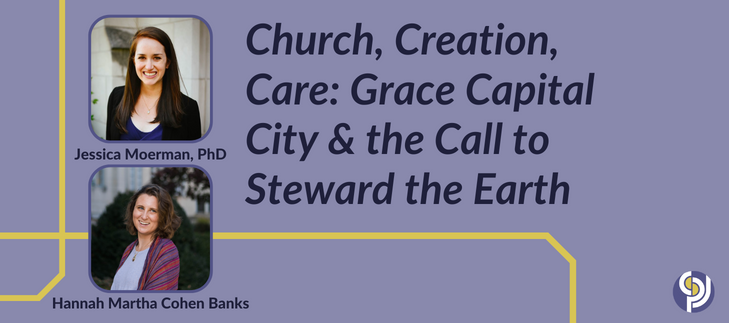
This article is a part of our series on environmental justice and creation care. The goal of this series is to explore the role of institutions and what social involvement looks like for Christian young adults and to explore the biblical calling to take care of the earth.
Emily Fromke: How did you all decide to plant a church in Washington, DC? It can’t be easy to plant a church, even just from a logistic and real estate perspective. I’d love to hear more about the story of the church.
Jessica Moerman: I serve as Co-founding pastor of Grace Capital City. My husband and I planted it; we came up here to DC from Atlanta in 2015 and then we officially launched it in 2016. The short answer of what brought us up to DC was simply Jesus. We can’t attribute it to anything other than that. My husband was pastoring in Atlanta as the associate pastor at our church in Midtown Atlanta. We had been there for about 6 years and I was finishing up my PhD in climate science at Georgia Tech there.
We loved our community in Atlanta, but we felt the Lord lifting our eyes for more. We come from a network of churches and church plants in the northern Georgia region, and our pastor at Grace Midtown had a vision for planting churches in global cities (10 global cities around the world). So when we felt the Lord stirring us up for something more, we went and asked our pastor what’s the first city? And he said, DC. My husband and I immediately had such peace about it because we did not have peace in the process leading up to that at all. So it really was then just following the Lord step by step, you know. For him [my husband] the process was kind of like getting and laying down the fleece. And timing. Well what about this hurdle of real estate? And who’s going to follow us to DC? This is a hard place to do it… We kept on laying down the fleece for each worry and concern and all those reasons you listed of why DC is a hard place. The Lord kept on providing the answer or the way of making a way. So it was just stepping in obedience. We just absolutely love the city. God continues to reveal why it made so much sense.
We’re a Bible teaching church; a Spirit filled worship church, and a church that has a deep heart. Our motto is “Kingdom come”. We want to see the Kingdom of God come here on Earth and so that means we’re very justice centered as well: bringing the things of heaven down here to Earth. That’s what we really see our justice activities as.
Hannah Martha Cohen Banks: I know that there are resources in this church in terms of expertise. Pastor Jessica being one of them being a climate scientist and having her Ph.D. in that research. So because of where we’re situated, we have a wealth of congregants that both have expertise in and a passion for this particular justice ministry. It’s a big blessing to be serving in this community and to have this passion. It feels very spirit-led—really exciting.
EF: I don’t know that I’ve ever heard of a church having a creation care or environmental justice ministry. I would love to hear how that got started at the church.
Jessica Moerman: It’s been a journey and the origins of it do start with my own personal revelation and calling from God. I got into climate science because I wanted to follow God into full-time ministry. So I prayed, “Lord, what would you have me do?” time and time again. This is me as an 18 year old. It always just came back down to: study science; study Earth Sciences and study geology. And I thought, what? I want to go into ministry. God just slowly revealed how that all went together. Again, first just getting that dangerous prayer of, “Lord, what would you have me do?” When you lay it on all out there you just so often get very surprising answers. We better be ready for a surprising answer. That was certainly the case for me. I was stepping through those hurdles: can I even be a scientist and a Christian?. Well, lo and behold, as I was wrestling through that, the Lord put a church leader right in my path who asked “What are you going to go off and study in college?” And I spilled my guts of: “I feel the Lord calling me into ministry by studying science and I don’t even know if I could do that (being a scientist and a Christian”. Practically, he’s calling me into geology. Then the leader listened to me and he said, “Jessica, don’t you know that I’m a geologist?” He just gave me that permission to be obedient to God’s calling. Then it was in science class learning about climate change where I can only attribute to the Holy Spirit speaking to me. He plunked down in my heart Matthew 22, “Love the Lord your God and love your neighbor as yourself,” and that was when I was connecting those dots of the weight of that statement with climate change. It’s the most vulnerable in society who Jesus calls us to serve, and those who are impacted first and worst [by climate change]. They’re the least responsible for these problems, and yet they’re impacted the most. It was at that moment where it clicked for me. Oh Lord, I see what you’re doing now. This is how, by studying environmental sciences and geology and now climate science, that there is a ministry connection: serving and loving my neighbor as myself by making sure that they have a healthy environment and a safe climate to thrive. This was a journey that the Lord led me on.
From there it was, “OK, I’m going to become a climate scientist. I’m going to learn about this problem and serve you and help others in the process.” and In the midst of all that I got married to my husband, who’s a pastor. It was along that way of our journey together of realizing, Wow, the church is one of the least activated areas in our society on this [environmental activism]. There’s a lot of disinformation that’s been spread amongst our brothers and sisters around climate change and environmental issues, but [Christians] should actually be at the forefront of this issue. Again, it does impact those people that we’re called to serve. It’s also honoring God to take good care of everything that he’s made, and that’s our first commission as humankind. In Genesis 1:26, it says that we’re made in God’s image so that we can take care of everything that he’s made. Along the way, there’s just been this disconnect. So I really felt this calling of helping lead the church in coming back to being those good stewards of God’s creation and loving our neighbor by ensuring they have a healthy creation to live in. So whenever we planted the church, [God] was like, well, this is something that we need to step into.
It’s a long story, but those are really kind of the origins and the threads. It’s been a process of discovering. It’s been a process of simply coming before the Lord, saying, “What would you have me do?” and just being obedient at each step that [God][ takes. I think a lot of churches aren’t engaged in it because of the messaging around climate change and environmental action. Well, [the Church hasn’t] done a good job of making those connections of why it is actually not some radical new idea or something we’re tacking on or something that the Church shouldn’t care about. [Creation care] is actually foundational to our faith. So that is the specific calling that I’ve had on my heart: to help bridge that gap.
Then, what I see is the Spirit is doing that with people. It’s not just me. The Spirit is doing that, making those awakenings — this awakening with people across the country and in churches across the country and speaking to Hannah. It was so wonderful that this is something that the Lord has his hand in. The more and more that I talk to a lot of folks, they say, “Yes, the Lord is putting this [call to care for the environment] on my heart, but I just don’t know how to walk it out.” That’s where at GCC we really feel as if we’re stepping out and doing this in our own community so it can really be a model and a grid for other churches to do that too.
Emily Fromke: That’s wonderful. That brings me into my next question. What is involved in your Creation Care ministry? What kinds of activities do you do? Who usually participates and joins? Is there anyone that you partner with?
Hannah Martha Cohen Banks: Jessica encouraged this model of an “up, in, and out” ministry: up toward God, in toward each other, out toward the world. So, we tried to model our justice behaviors around that: both within an individual event to have “up, in, and out” contexts, but also within the ministry in general. Jessica has been working toward, and we’ve been successful in having, a conference on Earth Day where we bring our community together and have these conversations. We invite other experts and other theologians and other nonprofits and things like that into this conversation, and we try to locally engage once a year.
We also are establishing a rhythm in the warmer months to partner with the Riverkeepers Network so that we can go and be hands on and clean up and be a part of the physical process. It’s also to be present and discern what the Lord is calling us to. A river is such a backbone of our natural world. I know that as we have done that, we generally start with a prayer and we arrive a little early so that we can be together as a community. We talk about context. We talk about, “What is this river? Where does it go to? What sort of water does it provide? What people groups have been here? Who are and have been the caretakers before us? What’s the ecological diversity here and what have been some challenges in caring for this river and body of water?” Creating that context has been helpful in helping people get specific about how they’re actioning, how they’re praying, how they’re going “up, in, and out”.
It’s also created an opportunity to be part of the community, to be seen and to interact with people who are not necessarily just within our church walls. We try to do a lot of partnerships with groups that already have a structure and are looking for us to plug in and with groups that already have an expertise and are looking for us to plug in. We also do internal things. We have a GCC “Buy-nothing” group. We have a GroupMe where we say, “Hey, who wants to go hike?” or “Who wants my, I don’t know, repurposed pumpkin squash?” We try to build a community around rhythms of creation care within ourselves and within our community.
Lastly, as a part of my job at GCC, in one hand I hold justice and in the other hand I hold operations. We’re trying to figure out how creation care can inform the operations of the church. Can we use QR codes instead of paper? Can we recycle well? Can we use compostable food containers? and can we send the food with our college kids, if there are leftovers? All of these things we’re trying to really integrate so that it’s not just a list of events and things that we do, but that it’s deeply formational. It’s also forming our context.
Jessica Moerman: It’s really that piece of integrating with the existing mission and value and unique ministry call and rhythms of our church. Sometimes it can feel for many churches that creating a stand-alone creation care ministry can be daunting or is a step too far. The thing is, and this is what Hannah and I are always assessing and looking at is how does creation care, climate action, climate justice— how does that intersect with our existing mission and values? Because whenever you scratch the surface and start really looking, you see that it is intersecting and is connected with everything that we do in the life of the church.
Hannah was mentioning good resource stewardship and financial stewardship and stewardship of the physical building and our operations. What we find is oftentimes whenever we have good stewardship practices that also means we’re better financial stewards of those resources. As Hannah was saying with that, the “up, in, and out” of connecting with God, connecting with each other, connecting with the community, we’re always looking with our other ministry areas — how can we play? How can we connect with what they’re doing? So we connected with our prayer and prophecy prophetic ministry just recently to do a prayer hike. That’s kind of looking at the, “How can we go and get out in God’s creation?” The Scriptures tell us all the time: “Creation proclaims the glory of God.” So whenever we get out into the things that he’s made, how do we know God better? How is he revealing himself in a deeper way to us? So that’s kind of the upside. But then we also found at the same time that it was an amazing opportunity. As we were doing that, other people were hiking by and were seeing what we were doing, so we were being a public witness as well.
I like to think about creation care as: it’s a discipleship issue. It’s a missional issue, and it’s an evangelistic issue as well. It’s an opportunity to spread the gospel, both with getting in spaces and doing things like the river cleanup where maybe the church wouldn’t be interacting with folks in that space. This is another opportunity to get into the community and show that Christians are active and care about this issue. It’s also really important in reaching the next generation — of reaching Millennials and Gen Z and those to come. I’m a Millennial. I know Gen Z deeply cares about a healthy environment and a safe climate, and they want to see the church acting on it. Again, it’s something that is not new and radical. It’s actually getting back to [the heart of God’s call in Genesis to take care of the earth]. It’s the more Orthodox position of the church to be good stewards of God’s creation, and so we’re kind of returning to that. I see a lot of young Christians leaving the church, because they aren’t seeing us active on that [call]. And we can look at other areas of intersection, especially within the missional space. If you look at hunger, if you look at poverty. We look at racial reconciliation and racial justice. There are deep connections with climate change, or poor environment, or dirty air, polluted air, polluted water, and all of that intersects with making those issues of hunger, poverty, racial justice worse. By bringing in that creation care lens to those mission areas, we are better able to carry out those missions and ministries as well.
Hannah Martha Cohen Banks: We also have ministries that coalesce around things that are not justice-related, although you could make the argument that all ministries are justice-related. But I have had ministries that coalesce around non justice related issues reach out to me and say “Hey, do you have creation care liturgies?” Do you have things in what ways in which we can engage as a community around some of the elements that we’re seeing in creation care as we’re starting to establish creation care, or continuing to establish creation care as part of our identity as a church?. We had a group that wanted to go on a group hike together and had never really done a group hike. They asked me, “Can you help us form a liturgy? So I got to do some research on the mountain that they were going to, the socio-political climate they were in, the flora and fauna that were there, and all of these things that they’re now going to learn about. It’s not just from Hannah pontificating, you know, but from being in the space, and they’re going to be able to go there and be a presence and pray. There’s something really incarnationally beautiful about recognizing that. It’s not recognizing in a way of coming to, but in a way of adding value to. The incarnational nature, the embodied nature of that, is crucial to our theology. You know we have a Savior who is incarnate, who is embodied. To be incarnate and embodied with our community and to have people want to engage with that is really exciting. It’s really beautiful.
Emily Fromke: How does creation care work look different or similar as a part of a church as compared to more of a generalized Christian nonprofit? I’d love it if you could delineate some of those differences and similarities for us.
Jessica Moerman: I can speak to that — I work for a nonprofit, the Evangelical Environmental Network, and we’re doing a lot of organizing of pockets of churches across the country who are interested in this. Their similarity is in the sense of as a Christian nonprofit, we are engaged in creation care. We’re looking at this [from a] high level and creating resources and structures for people and churches to get involved in this. We’re also involved in advocacy as well, but I find that what we do is more high-level: creating the training, creating the resources, creating the structures to plug people in. But whenever you’re doing it at a church, Hannah really nailed it. It’s incarnational, and it’s really the church where you get to activate all of those good ideas and practices, and you see the real world impact there. You see the impact of being able to pray for someone while doing the river cleanup, being able to see a community on the ground actually transformed. I think that’s more of that incarnational, face to face [impact]. It’s where the rubber hits the road and you actually get your hands dirty and begin to establish those relationships with the community members. I really feel that that’s the difference there. Nonprofit work is so important, but you see the Kingdom advance through our churches and from person to person, and so that’s what’s exciting about doing this work in our own church.
EF: When a Christian asks you, “Why should I, as a believer, care about the environment?”, what do you tell them?
Jessica Moerman: I think this is the same for a lot of justice issues. We care because God cares, first and foremost. He created this wonderful world that we live in. Just as God is our provider, he’s also provided his creation to sustain us as well: to sustain us physically and materially, and it’s also a conduit for knowing him better. There’s a spiritual aspect to that as well. And that’s also why we care. Again, that’s the discipleship side of things that God called his creation, including us — creation with us as people and as humans — good when he finished creating. Then, he goes and gives us the responsibility to keep it good. That’s an awesome assignment: he essentially said, “Here, take it. I’ve made this and I’m putting it in your hands now.” That is a huge responsibility. It’s an awesome assignment that we need to take seriously as disciples of and followers of Christ. Also, [we need to take it seriously] whenever we see the fruit of whenever we fail at that job, whether that’s pollution that is literally cutting lives short, especially amongst the most vulnerable: from unborn babies to the elderly, to people marginalized in society that are impacted most. That breaks God’s heart, and that should break our hearts too. As we’re called to serve the most vulnerable around us, we should, as Christians, look at every area of where that’s where folks are in need. This is actually very much an area of need.
Hannah Martha Cohen Banks: I sort of approach from the same, but opposite, lens. My background is in dance and when I went to divinity school, I was interested in studying embodied theology. I call myself a nature enthusiast. I’ve always been a little crunchy, and so I’ve started seeing all of these really, really deep overlaps of the way in which we hold theology around the body with the way in which we hold theology is around the earth and creation and and all that is within it. I think sometimes the theology we hold about who we are and and what it means to be incarnational and what it means to to have a body plays a lot in the way in which we see the earth and and our responsibility in it, and in our responsibility to others. It takes us out of this hyper-individualistic mindset into a community oriented mindset. For me, I’d jump into “Well, what does God say about you as part of creation? What does God say about your importance?” and build off of that. N.T. Wright has this really excellent article where he talks about the soul/spirit/body, all of these disparate parts. He says that one of the things that we get wrong is that we are not these Lego pieces assembled and hierarchy-ed, but that each of those is like a lens through which we see the wholeness of personhood. I think you can apply that directly to creation: that it’s not “There’s that one tree and that one tree does that one thing or that one rock, and that one rock does that one thing.” Rather, there’s this whole ecology around it, and that tree has a responsibility to the ecology, just as we have a responsibility to creation. That’s the direction I would go.
Emily Fromke: Thank you both so much for your time today. I hope the story of your ministry will inspire other Christians to think about the ways they can be good stewards of God’s creation in their church communities.
The Rev. Dr. Jessica Moerman is a climate and environmental scientist, pastor, educator, and advocate. She currently serves as Co-Founding Pastor at Grace Capital City in Washington, DC and as Vice President of Science and Policy at the Evangelical Environmental Network. Moerman received her Ph.D. in Earth and Atmospheric Sciences from the Georgia Institute of Technology and has held research positions at John Hopkins University, University of Michigan, and the Smithsonian National Museum of Natural History, where she researched how climate has changed throughout Earth’s history. Moerman is co-founding Pastor at her church, which she planted in 2016 with her husband Chris in the Dupont Circle neighborhood of Washington, DC. She is passionate about leading church communities towards positive solutions to safeguard our cities, neighborhoods, and the next generation from the effects of a warming world and life-threatening pollution.
Hannah Martha Cohen Banks is the Justice & Operations Director at Grace Capital City in Washington, DC. Banks earned her Masters in Theological Studies degree at Duke University’s Divinity School where she focused on embodied theology. There, she also earned a certificate in Theology and the Arts and a certificate in Prison Studies.She earned her Masters of Arts degree in Performance Studies from New York University in 2015 and in 2014 she completed a Bachelor of Arts degree from Hofstra University in Dance and a Bachelor of Arts degree in Film Studies and Production also from Hofstra University. Banks is a dancer and choreographer. She currently leads the Prophetic Dance Ministry at GCC and, prior to living in DC, she resided in NYC. Banks is an avid hiker, gardener, and forager. She recently married Timothy Banks, DC-based Architect whose passion is biomimicry and sustainable design. In 2022 they celebrated with a sustainable, local micro-wedding in Old Town Alexandria, Virginia.
Want to get involved?
1. Sign up to receive Shared Justice’s monthly newsletter and stay up to date on the latest content, resources, and highlights.
2. Write for us! To learn more about writing for Shared Justice, email emily.fromke@cpjustice.org.
3. Form a Political Discipleship group to practice meaningful political engagement in your community. The Center for Public Justice’s Political Discipleship is a guide for active Christian citizenship, designed to empower people with skills and tools to shape policy and address inequality and injustice in their communities. To learn more about starting a group, visit our website or contact emily.fromke@cpjustice.org






